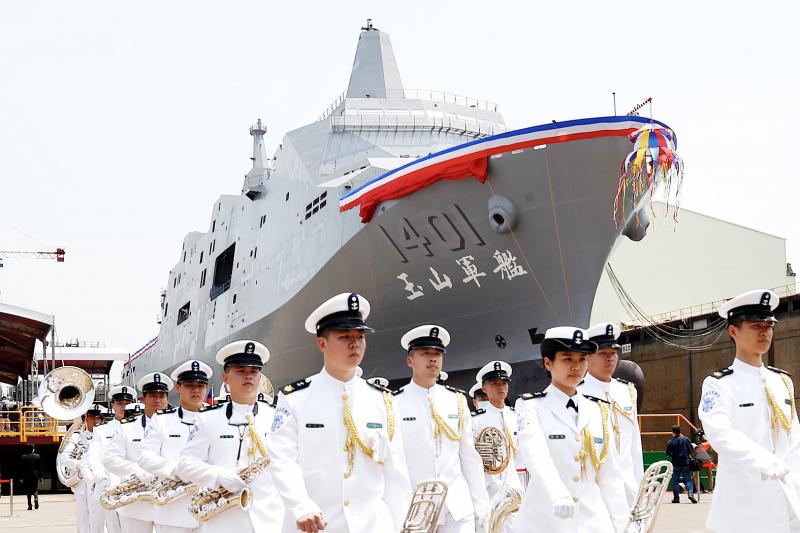The launch of the nation’s first domestically built amphibious transport dock marks a milestone in Taiwan’s shipbuilding history and would significantly boost the navy’s capabilities, President Tsai Ing-wen (蔡英文) said yesterday at a launch ceremony in Kaohsiung.
Tsai said that the amphibious transport dock, named Yu Shan (玉山) after the nation’s highest peak, is the navy’s first in the 10,000-tonne category.
With its imminent deployment, the nation’s defense capabilities would be boosted, as the navy’s operations would be enhanced, she said at the ceremony at the Kaohsiung shipyard of shipbuilder CSBC Corp, Taiwan (台灣國際造船).

Photo: Ritchie B. Tongo, EPA-EFE
CSBC in April 2018 won a bid to build an amphibious transport dock prototype at a cost of NT$4.6 billion (US$161.6 million).
The prototype is expected to go into service in the first half of next year, replacing the navy’s only amphibious transport dock, the ROCS Hsu Hai, which has been in service for 50 years and was formerly named the USS Pensacola.
The new ship is to be used to support amphibious operations and transport missions, while also serving as a hospital ship on humanitarian assistance and disaster relief missions in peacetime.

Photo: Chiang Ying-ying, AP
Military sources said that it is to be fitted with an MK-75 76mm gun, two MK-15 Phalanx close-in weapons systems, and two Tien Chien-2N radar guided surface-to-air missiles.
It is able to support various landing craft, assault amphibious vehicles and two helicopters, and has a maximum load of 673 people, the sources said.
CSBC chairman Cheng Wen-lon (鄭文隆) said that the vessel is 153m long and 23m wide.
Su Tzu-yun (蘇紫雲), a senior analyst at the government-funded Institute for National Defense and Security Research, said that the navy had been using the decommissioned US-made amphibious transport dock, but because of its age, the maintenance costs were high, so the nation decided to build its own amphibious transport dock.
The launch was part of the nation’s ongoing efforts to expand its indigenous defense capacity by building its own aircraft, ships and submarines, an initiative that began when Tsai took office in May 2016.

A magnitude 5.6 earthquake struck off the coast of Yilan County at 12:37pm today, with clear shaking felt across much of northern Taiwan. There were no immediate reports of damage. The epicenter of the quake was 16.9km east-southeast of Yilan County Hall offshore at a depth of 66.8km, Central Weather Administration (CWA) data showed. The maximum intensity registered at a 4 in Yilan County’s Nanao Township (南澳) on Taiwan’s seven-tier scale. Other parts of Yilan, as well as certain areas of Hualien County, Taipei, New Taipei City, Taoyuan, Hsinchu County, Taichung and Miaoli County, recorded intensities of 3. Residents of Yilan County and Taipei received

Taiwan has secured another breakthrough in fruit exports, with jujubes, dragon fruit and lychees approved for shipment to the EU, the Ministry of Agriculture said yesterday. The Animal and Plant Health Inspection Agency on Thursday received formal notification of the approval from the EU, the ministry said, adding that the decision was expected to expand Taiwanese fruit producers’ access to high-end European markets. Taiwan exported 126 tonnes of lychees last year, valued at US$1.48 million, with Japan accounting for 102 tonnes. Other export destinations included New Zealand, Hong Kong, the US and Australia, ministry data showed. Jujube exports totaled 103 tonnes, valued at

TRUST: The KMT said it respected the US’ timing and considerations, and hoped it would continue to honor its commitments to helping Taiwan bolster its defenses and deterrence US President Donald Trump is delaying a multibillion-dollar arms sale to Taiwan to ensure his visit to Beijing is successful, a New York Times report said. The weapons sales package has stalled in the US Department of State, the report said, citing US officials it did not identify. The White House has told agencies not to push forward ahead of Trump’s meeting with Chinese President Xi Jinping (習近平), it said. The two last month held a phone call to discuss trade and geopolitical flashpoints ahead of the summit. Xi raised the Taiwan issue and urged the US to handle arms sales to

BIG SPENDERS: Foreign investors bought the most Taiwan equities since 2005, signaling confidence that an AI boom would continue to benefit chipmakers Taiwan Semiconductor Manufacturing Co’s (TSMC, 台積電) market capitalization swelled to US$2 trillion for the first time following a 4.25 percent rally in its American depositary receipts (ADR) overnight, putting the world’s biggest contract chipmaker sixth on the list of the world’s biggest companies by market capitalization, just behind Amazon.com Inc. The site CompaniesMarketcap.com ranked TSMC ahead of Saudi Aramco and Meta Platforms Inc. The Taiwanese company’s ADRs on Tuesday surged to US$385.75 on the New York Stock Exchange, as strong demand for artificial intelligence (AI) applications led to chip supply constraints and boost revenue growth to record-breaking levels. Each TSMC ADR represents